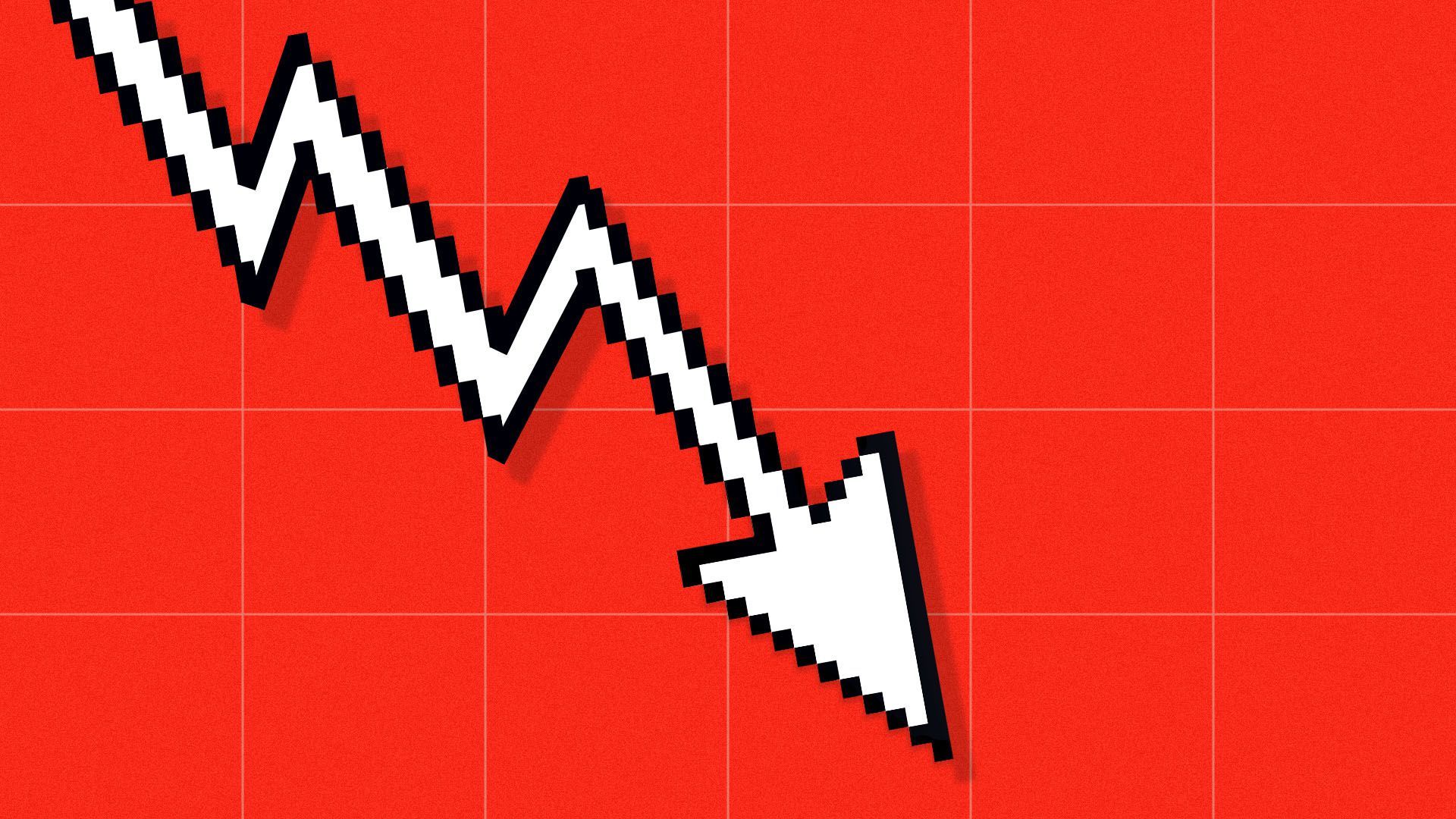| | | | | | | Presented By NetJets | | | | Axios Markets | | By Dion Rabouin ·Mar 09, 2021 | | Good morning! Was this email forwarded to you? Sign up here. (Today's Smart Brevity count: 953 words, 3.6 minutes.) 🎙 "If the game shakes me or breaks me, I hope it makes me a better man, take a better stand, put money in my mom's hand, get my daughter this college grant so she don't need no man. Stay far from timid, only make moves when your heart's in it, and live the phrase 'Sky's the limit.'" - See who said it and why it matters at the bottom. | | | | | | 1 big thing: Why the tech selloff matters |  | | | Illustration: Sarah Grillo/Axios | | | | Rising U.S. bond yields again sent tech stocks tumbling on Monday, with the tech-heavy Nasdaq composite index falling into its third 10% correction in the last year. Why it matters: With the real economy still depressed, especially the labor market, continued weakness in Big Tech and a deflating housing market could undercut the expected economic recovery. - Both stocks and housing have been underpinned by historically low interest rates and inflation expectations, which now are jumping at the fastest pace in years.
What it means: Tech stocks have been incredibly volatile over the past year, rising and falling more than the rest of the market, as even trillion-dollar companies like Apple routinely see 3% and 4% daily moves. The big picture: The exaggerated stock price moves in tech are amplifying overall market volatility, but that volatility bears watching because of the growing role tech plays in the U.S. economy. - All five of the largest U.S. companies by market cap are in tech — Apple, Microsoft, Amazon, Alphabet and Facebook, in that order — and together they hold a market cap of more than $8.2 trillion.
- The entire S&P 500 has a market cap of $33.9 trillion, according to S&P Global, meaning the Big Five account for just under a quarter of the benchmark U.S. stock index's value.
By the numbers: On Monday, those five companies suffered an average share decline of 3%, led by 4% pullbacks in Apple and Amazon. - Tech companies across the board have been stung by the selloff, with previous world-beating market champions including Tesla, Zoom, Nvidia, Square and AMD all down by 20% since Feb. 12, when the Nasdaq hit its last record high.
- Tesla is actually down by 35% from its last record high on Jan. 26, the third time in about a year it has lost close to a third of its value.
Between the lines: Despite all the talk of investors rotating from big, tech-heavy growth stocks to "cheaper" value stocks over the past month, the biggest beneficiaries of the rotation have been stocks with incredibly high forward price-to-earnings ratios like ExxonMobil (278.2 12-month forward P/E), Disney (60.2) and Mastercard (45.8). |     | | | | | | 2. Catch up quick | | Short bets against star stock picker Cathie Wood's main ARK Invest ETF have risen to a record high. (Bloomberg) A Brazilian Supreme Court judge annulled criminal convictions against former President Luiz Inácio Lula da Silva on Monday clearing the way for the far-left politician to run against far-right President Jair Bolsonaro in next year's presidential election. (Reuters) Even after the recent spike that saw 10-year Treasury yields rise above 1.6%, relative to skying economic growth estimates, U.S. rates haven't been this low since 1966. (Bloomberg) The European Central Bank again blamed large bond redemptions for a decline in the pace of its emergency purchases last week, even as governing council members have said the bank needs to take action to reduce rising rates. (Reuters) The forced delisting of China's largest offshore oil producer, CNOOC, from the NYSE is likely to be followed by more exits, including software company Luokung Technology and phone maker Xiaomi, as the Biden administration holds a tough line on China. (Nikkei) |     | | | | | | 3. Consumers' inflation expectations are the highest in 7 years |  Data: New York Fed; Chart: Axios Visuals The New York Fed's latest survey of consumers shows that average Americans are joining investors in boosting their expectations for inflation, with consumers' one-year inflation expectations rising to the highest level since July 2014. Why it matters: Inflation is largely controlled by inflation expectations. If individuals expect costs to rise they will generally demand higher pay, landlords will raise rents and businesses will increase the cost of goods and services, pushing inflation higher. Flashback: Fed chair Jerome Powell last week said he didn't expect prices to increase to the point "where they would move inflation expectations materially above 2%." - But the data show consumers clearly see inflation rising materially above 2% over both a one-year and three-year time horizon (the survey found consumers' three-year inflation expectations were 3%, unchanged from January).
- Investors also expect inflation to move well above 2%, as evidenced by the levels of 5-year, 10-year and 30-year breakeven inflation rates all currently above 2%.
Details: The biggest factors in the increased inflation expectations were median expectations for rent and gas prices, which jumped to 9% for the cost of rent from 6.4% in January and to 9.6% for gas from 6.2% the previous month. Don't sleep: "To be sure, if bond yields continue to rise and there is a smooth rotation out of growth and defensive stocks into value and cyclical stocks, the Fed will remain sanguine," Société Générale strategist Albert Edwards told clients in a note last month. - "But the risk is growing that with so many bubbles blown by the Fed something will burst soon."
|     | | | | | | A message from NetJets | | Multiple ways to fly with NetJets | | |  | | | | The NetJets Card Program™ offers all-inclusive pricing and guaranteed access to the largest fleet in private aviation. Choose from multiple jet card options with the ultimate convenience of NetJets. Discover ways to fly with all-inclusive pricing. | | | | | | 4. Consumers' expectations for jobs and their finances are in a rut |  Data: New York Fed; Chart: Axios Visuals U.S. consumers are not expecting much growth in their own household income — expectations decreased from January and are below their February 2020 level, the New York Fed's survey shows. What happened: Expectations for household income growth declined for the first time since October last month, showing a renewed lack of confidence. - The number is well below February 2020's 2.7% growth expectation when one-year ahead inflation expectations were 2.5%.
Expectations for finding a job also are falling, with the mean perceived probability of securing new employment after losing a job falling to 48.8% in February from 49.5% in January. - While above its recent low of 46.2% in December, the number remains well below the February 2020 level of 58.7%.
The big picture: The Fed's survey suggests that Americans are expecting inflation to materially rise while their own financial situations lag behind. |     | | | | | | 5. Copper and gold show investors remain bullish on the economy |  Data: FactSet; Chart: Axios Visuals Even as copper prices have struggled over the past couple of weeks, the metal has managed to remain strongly in positive territory for the year, in contrast to gold, which has sunk so far in 2021. Why it matters: Copper prices are a measure of bullish economic momentum, because copper is a prime input in products like houses, factories and electronics, while gold is a bearish market indicator suggesting investors see little value in other assets. |     | | | | | | A message from NetJets | | NetJets' most popular aircraft model | | |  | | | | NetJets' Cessna® Citation Latitude® is designed with your optimum comfort in mind. A new opportunity: This midsize favorite has a generous amount of cabin space and is now available through the NetJets Card Program™. Explore the world's finest fleet. | | | | Thanks for reading! Quote: "If the game shakes me or breaks me, I hope it makes me a better man, take a better stand, put money in my mom's hand, get my daughter this college grant so she don't need no man. Stay far from timid, only make moves when your heart's in it, and live the phrase 'Sky's the limit.'" Why it matters: On March 9, 1997, Christopher Wallace, aka The Notorious B.I.G., suffered an untimely death. - Many investors remember March 9 as the start of the bull market in 2009, but the true importance of March 9 is honoring and remembering the late, great Biggie Smalls.
| | | | Axios thanks our partners for supporting our newsletters.
Sponsorship has no influence on editorial content. Axios, 3100 Clarendon Blvd, Suite 1300, Arlington VA 22201 | | | You received this email because you signed up for newsletters from Axios.
Change your preferences or unsubscribe here. | | | Was this email forwarded to you?
Sign up now to get Axios in your inbox. | | | | Follow Axios on social media:    | | | | | |







No comments:
Post a Comment